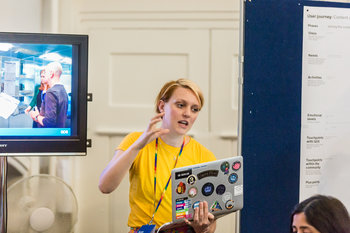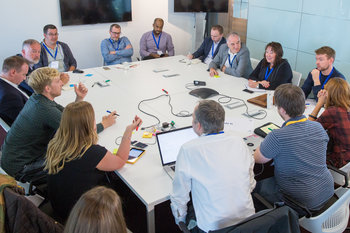
Poor Arguments
Poor arguments are self-centered, emotionally driven or flawed such that they are unlikely to generate support.I want a raise because I have 25 years experience.
Persuasion
Persuasion attempts to influence an audience by considering their motivations and needs as opposed to stating what you want.I closed that 25 million dollar deal by leveraging my relationships in the industry and can continue to detect, pursue and close large deals. However, my compensation is below market for this level of results.
Anticipating Objections
Anticipating objections such that you think about possible perceived weaknesses in your argument and handle these up front.You may be thinking -- how much will all this cost? I'm happy to tell you that we can get the pilot done for about $50,000, which is less than 1% of our quarterly IT budget.
Argument from Authority
Argument from authority, or ethos, is a reference to a high status institution or person. This is often structured as a fallacy whereby you suggest that someone who isn't an authority doesn't deserve a voice.Parents should leave education to the experts and stay out of it.
Weasel Words
Weasel words is the common practice of referencing an anonymous authority to support your argument by suggesting that you are simply representing their opinion.According to the science ...
Science says ....
Doctors believe ...
Experts say ...
Economists know ...
Americans want ...
Scientists tell me ...
Studies show ...
Structural engineers will tell you ...
People say ...
Science says ....
Doctors believe ...
Experts say ...
Economists know ...
Americans want ...
Scientists tell me ...
Studies show ...
Structural engineers will tell you ...
People say ...
Numerical Evidence
People like numbers. Giving numbers tends to boost people's confidence in your argument. This is true even where the numbers don't do anything to directly support your position.Education is important. 17% of teenagers in our state drop out of high school before graduating. If spending on education is cut, this number is only likely to increase.
Challenging Assumptions
Challenging assumptions is the process of identifying the things that your opponent has assumed without any proof and pointing this out.Why do you imagine there is a relationship between education spending and drop-out rate? Did you just make this up or do you have data? The high drop-out rate indicates the money that we are spending is going to waste. We can do things more efficiently and creatively as opposed to throwing more money at a failing system.
Proof by Example
Stating a statistically insignificant example as proof of something that has been studied in far more detail such that your example is a comparatively weak form of evidence. This is essentially a fallacy but people may find this convincing nonetheless.My friend took that treatment and got sick. It's not good.
Meaningful Examples
Examples are meaningful to many arguments where they are relevant or serve as an analogy.He is trustworthy. He worked for me for years and was always candid and straightforward. Once I accidentally overpaid him and he pointed out my mistake.
Argument From Ignorance
Argument from ignorance is the practice of shifting the burden of proof from where it belongs.If you are innocent, prove it.
Where is your evidence that this treatment doesn't work.
You can't prove that green aliens don't control the music industry. Therefore they must.
Where is your evidence that this treatment doesn't work.
You can't prove that green aliens don't control the music industry. Therefore they must.
Logical Argument
A logical argument, or logos, gives reasons that support your argument. Just because something is logical doesn't mean it's correct as logic is garbage in, garbage out. However, it is very common for people to support arguments they perceive as logical.42% of tax payers regularly use a bicycle but 99.8% of the city's transportation budget goes to car infrastructure. This makes no sense.
Rational Argument
A rational argument is an argument that most people would view as reasonable. This goes beyond logic to incorporate human ways of thinking such as values, culture and beliefs.Youth need a venue for calculated risk taking, exercise and social interaction, skateparks provide these things.
Analogy
People commonly reason with analogies whereby you consider if things that are similar in one way are also similar in some other ways. This can be quite persuasive and memorable.If you want to make beautiful music, you must play the black and the white notes together.
― Richard Nixon
Appeal to Emotion
An appeal to emotion, or ethos, is designed to generate emotions in the audience that support your argument.Think of your children. They deserve a future. It is simply not fair to load them up with debt.
Active Silence
The strategic use of silence such as a dramatic pause. This can include leaving long awkward silences where it is to your advantage, such as after your opponent says something thoroughly unconvincing.A: So you represent all of science?
B: Yes, I do.
A: [silence] ... wow
B: Yes, I do.
A: [silence] ... wow
Nudges
A nudge is a gentle suggestion such as a rhetorical question that can be shaped to try to get the audience to feel that your position is their idea.Is there a way to make streets safer for bicycles? Is this important?
Red Herring
A red herring is an argument that is used as a distraction. For example, attacking the person instead of their argument.A: How can the government award such a large contract without an open and transparent competitive bidding process?
B: What are you an accountant? I don't think so.
B: What are you an accountant? I don't think so.
Not Even Wrong
Not even wrong is the practice of saying things that are nonsensical that are difficult to counter. This can involve the use of obscure academic or domain language.A: How can the government award such a large contract without an open and transparent competitive bidding process?
B: There are systems that are used for these processes that interface with the processes themselves.
B: There are systems that are used for these processes that interface with the processes themselves.
Dichotomy / False Dichotomy
A dichotomy presents things as necessary and unavoidable tradeoffs. These are usually false dichotomies whereby other possibilities exist but are disregarded.You're either with us or against us.
Freedom vs security/safety
Environment vs economic growth
We can't save the planet without changing our diet.
Freedom vs security/safety
Environment vs economic growth
We can't save the planet without changing our diet.
Strawman
A strawman is a misrepresentation of your opponent's argument that is easier to counter.A: We should raise taxes on the wealthy.
B: I already pay close to 35% in income tax and I am certainly not wealthy. You think that the government is entitled to more of my salary! Where does it end 50%? 90%?
B: I already pay close to 35% in income tax and I am certainly not wealthy. You think that the government is entitled to more of my salary! Where does it end 50%? 90%?
Steelman
Making your opponent's argument stronger before countering. This is done where your opponent's argument is too easy to counter such that making it stronger benefits your argument.Son: I am going to quit school and become a famous business person.
Father: So you want freedom, you want to go into business some day. I can really understand these things but I want you to come up with a more realistic plan than quitting school in grade 7.
Father: So you want freedom, you want to go into business some day. I can really understand these things but I want you to come up with a more realistic plan than quitting school in grade 7.








































